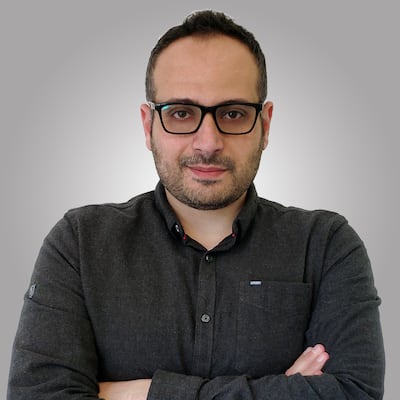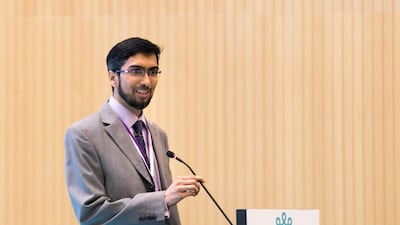The UAE’s National Genome Strategy has been hailed by scientists as one of the most ambitious programmes yet to analyse the genetic material of a country’s population.
As reported in The National, more than 400,000 citizens have already submitted cheek swabs or blood samples for analysis, with the aim being to collect one million samples.
From each sample, automated sequencing machines will be able to produce a profile of that individual’s genome, their complete set of genetic material.
It’s a transformative project. There’s no country where that has been done before – sequencing the whole population
Dr Raghib Ali,
director of the Public Health Research Centre at NYU Abu Dhabi
This information may pinpoint which diseases the person is more vulnerable to or indicate which drugs would work most effectively on them.
Such large-scale analysis has become possible because the cost of sequencing has dropped dramatically at the same time as the speed has increased.
"The first genome [sequenced] cost $3 billion. Up until recently, it cost a few thousand dollars. Now it’s a few hundred. The cost of sequencing everybody’s genome is relatively affordable," said Raghib Ali, director of the Public Health Research Centre at NYU Abu Dhabi and principal investigator of the UAE Healthy Future Study.
"Having that information on this scale means that instead of it being primarily a research project, it can also be used for clinical utility.
"It’s a transformative project. There’s no country where that has been done before – sequencing the whole population," Dr Ali said
Neighbouring countries also have initiatives in which large numbers of people are having their genetic material sequenced, including Saudi Arabia, with the Saudi Genome Project, and Qatar with the Qatar Genome Programme.
Marc Haber, an associate professor in the Institute of Cancer and Genomic Sciences at the University of Birmingham Dubai, said currently a person may be prescribed several drugs in succession by a doctor until one that works is found.
A patient’s genetic information may help doctors to know which drugs will work and which ones will not, making treatment more effective and reducing the risk that the individual experiences side effects after taking numerous medications.
"The idea of precision medicine is using your genetic background, but also other health information, and using databases like the one the Emirates is trying to create now … to be able to predict what diseases this person will develop in future, but also what is the best treatment for this person," Dr Haber said.
"We’re going into more precision medicine in the future and the only way for us to do it is to have a population sequencing project like this one."
Genes are made up of sequences of chemical groups known as bases, which exist in bonded pairs in a strand of DNA. There are four bases in DNA – adenine, cytosine, guanine and thymine.
Proteins are coded for by genes, and the sequence of base pairs in a gene determines which protein that gene will produce. These proteins determine how cells function and grow.
"The different sequence of those bases is what makes you unique," Dr Haber said. "You have 3.2 billion base pairs in your genome. The aim is to sequence all of those.
"When you sequence them you understand how they are arranged on your genome and you start to understand the differences between one person and another person, but also differences between one population and another population."
Finding the link between genes and particular diseases
Aside from benefits in terms of precision or personalised medicine, projects such as the National Genome Strategy, by comparing genetic data with the medical history of large numbers of individuals, identify associations between genes and particular diseases.
With greater numbers of people, this becomes possible even for complex diseases that may be influenced by several genes.
"It’s very clear from projects … in England and lots of other international endeavours that [sequencing] has the potential to completely revolutionise the diagnosis of disease and the [understanding of the] molecular basis of disease," said Sarah Ennis, professor of genomics at the University of Southampton in the UK.
Most genetic studies have been carried out on people who are of European heritage, meaning that the association between disease and genetics is better characterised for these populations. Projects such as the National Genome Strategy, which will be completed over the next decade, help to redress this imbalance.
"Historically the Arab world contributed less than 1 per cent [of the data to genetic studies]. All these one million will make a big difference," Dr Ali said.
Having very large numbers of samples also helps scientific studies into issues such as lineage and ancestry, potentially shedding more light on the origins of the UAE’s citizens.
The amount of data generated by large-scale sequencing is so great that processing it and gaining insights can be difficult.
"We use machine learning, artificial intelligence and other high throughput modelling systems to be able to [cope] with the [amount] of data," Prof Ennis said.
KILLING OF QASSEM SULEIMANI
Infiniti QX80 specs
Engine: twin-turbocharged 3.5-liter V6
Power: 450hp
Torque: 700Nm
Price: From Dh450,000, Autograph model from Dh510,000
Available: Now
The specs: 2018 Audi RS5
Price, base: Dh359,200
Engine: 2.9L twin-turbo V6
Transmission: Eight-speed automatic
Power: 450hp at 5,700rpm
Torque: 600Nm at 1,900rpm
Fuel economy, combined: 8.7L / 100km
The specs
AT4 Ultimate, as tested
Engine: 6.2-litre V8
Power: 420hp
Torque: 623Nm
Transmission: 10-speed automatic
Price: From Dh330,800 (Elevation: Dh236,400; AT4: Dh286,800; Denali: Dh345,800)
On sale: Now
Killing of Qassem Suleimani
Zayed Sustainability Prize
The burning issue
The internal combustion engine is facing a watershed moment – major manufacturer Volvo is to stop producing petroleum-powered vehicles by 2021 and countries in Europe, including the UK, have vowed to ban their sale before 2040. The National takes a look at the story of one of the most successful technologies of the last 100 years and how it has impacted life in the UAE.
Read part four: an affection for classic cars lives on
Read part three: the age of the electric vehicle begins
Read part one: how cars came to the UAE
Killing of Qassem Suleimani
The specs
Engine: 2.0-litre 4cyl turbo
Power: 261hp at 5,500rpm
Torque: 405Nm at 1,750-3,500rpm
Transmission: 9-speed auto
Fuel consumption: 6.9L/100km
On sale: Now
Price: From Dh117,059
Killing of Qassem Suleimani
Read more about the coronavirus
Mohammed bin Zayed Majlis
Small Victories: The True Story of Faith No More by Adrian Harte
Jawbone Press
Where to Find Me by Alba Arikha
Alma Books
More on Quran memorisation:
From Zero
Artist: Linkin Park
Label: Warner Records
Number of tracks: 11
Rating: 4/5
Mohammed bin Zayed Majlis
KILLING OF QASSEM SULEIMANI
Squad: Majed Naser, Abdulaziz Sanqour, Walid Abbas, Khamis Esmail, Habib Fardan, Mohammed Marzouq (Shabab Al Ahli Dubai), Khalid Essa, Muhanad Salem, Mohammed Ahmed, Ismail Ahmed, Ahmed Barman, Amer Abdulrahman, Omar Abdulrahman (Al Ain), Ali Khaseif, Fares Juma, Mohammed Fawzi, Khalfan Mubarak, Mohammed Jamal, Ahmed Al Attas (Al Jazira), Ahmed Rashid, Mohammed Al Akbari (Al Wahda), Tariq Ahmed, Mahmoud Khamis, Khalifa Mubarak, Jassim Yaqoub (Al Nasr), Ali Salmeen (Al Wasl), Yousef Saeed (Sharjah), Suhail Al Nubi (Baniyas)
The Perfect Couple
Starring: Nicole Kidman, Liev Schreiber, Jack Reynor
Creator: Jenna Lamia
Rating: 3/5
Red flags
- Promises of high, fixed or 'guaranteed' returns.
- Unregulated structured products or complex investments often used to bypass traditional safeguards.
- Lack of clear information, vague language, no access to audited financials.
- Overseas companies targeting investors in other jurisdictions - this can make legal recovery difficult.
- Hard-selling tactics - creating urgency, offering 'exclusive' deals.
Courtesy: Carol Glynn, founder of Conscious Finance Coaching
The years Ramadan fell in May
Other IPL batting records
Most sixes: 292 – Chris Gayle
Most fours: 491 – Gautam Gambhir
Highest individual score: 175 not out – Chris Gayle (for Royal Challengers Bangalore against Pune Warriors in 2013)
Highest strike-rate: 177.29 – Andre Russell
Highest strike-rate in an innings: 422.22 – Chris Morris (for Delhi Daredevils against Rising Pune Supergiant in 2017)
Highest average: 52.16 – Vijay Shankar
Most centuries: 6 – Chris Gayle
Most fifties: 36 – Gautam Gambhir
Fastest hundred (balls faced): 30 – Chris Gayle (for Royal Challengers Bangalore against Pune Warriors in 2013)
Fastest fifty (balls faced): 14 – Lokesh Rahul (for Kings XI Punjab against Delhi Daredevils in 2018)
The five pillars of Islam
Pharaoh's curse
British aristocrat Lord Carnarvon, who funded the expedition to find the Tutankhamun tomb, died in a Cairo hotel four months after the crypt was opened.
He had been in poor health for many years after a car crash, and a mosquito bite made worse by a shaving cut led to blood poisoning and pneumonia.
Reports at the time said Lord Carnarvon suffered from “pain as the inflammation affected the nasal passages and eyes”.
Decades later, scientists contended he had died of aspergillosis after inhaling spores of the fungus aspergillus in the tomb, which can lie dormant for months. The fact several others who entered were also found dead withiin a short time led to the myth of the curse.
Mohammed bin Zayed Majlis
More from Neighbourhood Watch:
UAE currency: the story behind the money in your pockets
About Housecall
Date started: July 2020
Founders: Omar and Humaid Alzaabi
Based: Abu Dhabi
Sector: HealthTech
# of staff: 10
Funding to date: Self-funded
More on animal trafficking
Killing of Qassem Suleimani
Dhadak 2
Director: Shazia Iqbal
Starring: Siddhant Chaturvedi, Triptii Dimri
Rating: 1/5
The%20specs
%3Cp%3E%3Cstrong%3EEngine%3A%20%3C%2Fstrong%3E2.0-litre%204-cyl%20turbo%3Cbr%3E%3Cstrong%3EPower%3A%20%3C%2Fstrong%3E190hp%20at%205%2C600rpm%3Cbr%3E%3Cstrong%3ETorque%3A%20%3C%2Fstrong%3E320Nm%20at%201%2C500-4%2C000rpm%3Cbr%3E%3Cstrong%3ETransmission%3A%20%3C%2Fstrong%3E7-speed%20dual-clutch%20auto%3Cbr%3E%3Cstrong%3EFuel%20consumption%3A%20%3C%2Fstrong%3E10.9L%2F100km%3Cbr%3E%3Cstrong%3EPrice%3A%20%3C%2Fstrong%3EFrom%20Dh119%2C900%3Cbr%3E%3Cstrong%3EOn%20sale%3A%20%3C%2Fstrong%3ENow%3C%2Fp%3E%0A
The%20specs
%3Cp%3E%3Cstrong%3EPowertrain%3A%20%3C%2Fstrong%3ESingle%20electric%20motor%0D%3Cbr%3E%3Cstrong%3EPower%3A%20%3C%2Fstrong%3E201hp%0D%3Cbr%3E%3Cstrong%3ETorque%3A%20%3C%2Fstrong%3E310Nm%0D%3Cbr%3E%3Cstrong%3ETransmission%3A%20%3C%2Fstrong%3ESingle-speed%20auto%0D%3Cbr%3E%3Cstrong%3EBattery%3A%20%3C%2Fstrong%3E53kWh%20lithium-ion%20battery%20pack%20(GS%20base%20model)%3B%2070kWh%20battery%20pack%20(GF)%0D%3Cbr%3E%3Cstrong%3ETouring%20range%3A%20%3C%2Fstrong%3E350km%20(GS)%3B%20480km%20(GF)%0D%3Cbr%3E%3Cstrong%3EPrice%3A%20%3C%2Fstrong%3EFrom%20Dh129%2C900%20(GS)%3B%20Dh149%2C000%20(GF)%0D%3Cbr%3E%3Cstrong%3EOn%20sale%3A%3C%2Fstrong%3E%20Now%3C%2Fp%3E%0A
The years Ramadan fell in May
Specs
Engine: Duel electric motors
Power: 659hp
Torque: 1075Nm
On sale: Available for pre-order now
Price: On request
More from Rashmee Roshan Lall
More from Neighbourhood Watch:
THE%20SWIMMERS
%3Cp%3E%3Cstrong%3EDirector%3A%20%3C%2Fstrong%3ESally%20El-Hosaini%3C%2Fp%3E%0A%3Cp%3E%3Cstrong%3EStars%3A%20%3C%2Fstrong%3ENathalie%20Issa%2C%20Manal%20Issa%2C%20Ahmed%20Malek%20and%20Ali%20Suliman%C2%A0%3C%2Fp%3E%0A%3Cp%3E%3Cstrong%3ERating%3A%20%3C%2Fstrong%3E4%2F5%3C%2Fp%3E%0A
TRAP
Starring: Josh Hartnett, Saleka Shyamalan, Ariel Donaghue
Director: M Night Shyamalan
Rating: 3/5




